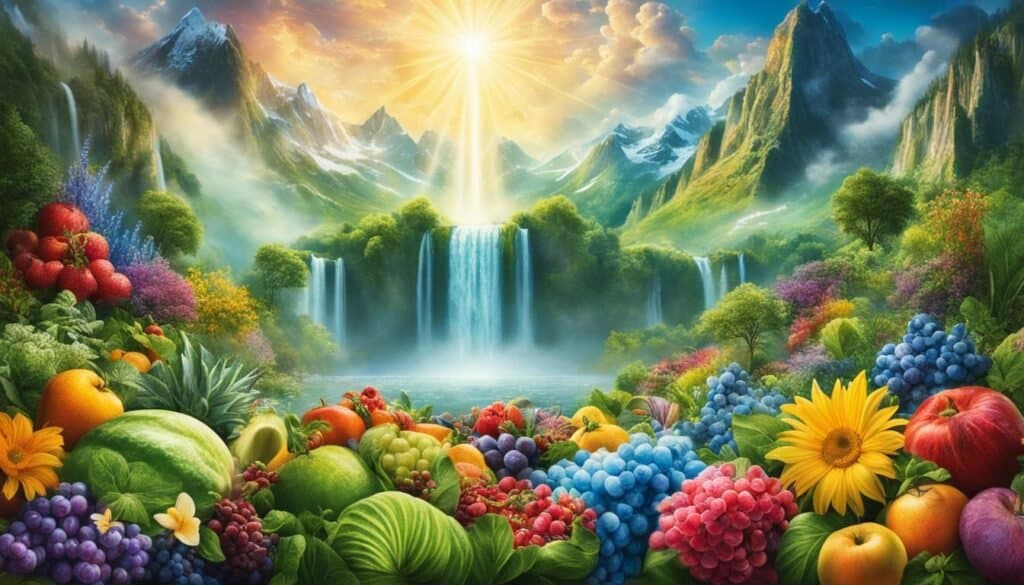When we ponder God’s nature, some may see Him as distant and uncaring. Others view Him as a God craving connection with humanity. The Book of Genesis peels back the layers, showing God’s immense power and wisdom. It also highlights His deep love for all He has made. Exploring Genesis brings us to hidden gems that reveal God’s heart.
Creator and Sovereign: The Power and Majesty of God
The book of Genesis starts with a key statement. It says God created the world. This phrase shows us the amazing power and greatness of God.
God is the sole creator, meaning He made everything. He’s not limited by time or space but exists beyond our understanding. God is the start of all life and the one who leads the universe.
“For by him all things were created, in heaven and on earth, visible and invisible, whether thrones or dominions or rulers or authorities—all things were created through him and for him.”
– Colossians 1:16 (ESV)
The word sovereign means God has complete and total control. He guides the world’s events by His grand design. God doesn’t just watch from afar; He’s actively involved in our lives. He rules wisely and powerfully.
God: The Supreme Authority
God being the creator and sovereign has huge impacts on us. Realizing His power makes us humble. It shows we’re part of something much bigger than ourselves. This leads us to devote our lives to Him.
Seeing God as creator and sovereign helps our faith. It tells us that God is always in control. He can keep His promises and help us in hard times. We trust Him to guide us, knowing His plans are for our best.
The Power of God’s Creation
The beauty of God’s creation shows His power. From the endless sky to a tiny flower, it all proves His creative might. This reminds us of the great power and wisdom of our Creator.
Image:
The Table of Creation
| Creation | Description |
|---|---|
| Day 1 | God separates light from darkness, creating day and night. |
| Day 2 | God creates the sky and separates the waters above from the waters below. |
| Day 3 | God gathers the waters, creating seas, and allows dry land to appear. He also brings forth vegetation, plants, and trees. |
| Day 4 | God creates the sun, moon, and stars to govern the day and night. |
| Day 5 | God fills the seas with fish and other sea creatures and creates birds to fill the skies. |
| Day 6 | God creates land animals and ultimately forms humanity in His own image, breathing life into Adam and Eve. |
| Day 7 | God rests, blessing and sanctifying the seventh day as a day of rest and worship. |
Order and Purpose: The Intentional Design in Creation
In the Book of Genesis, creation unfolds with remarkable order and purpose. Each step, from light’s formation to earth and heavens’ establishment, is called “good” by God. This design shows God’s wisdom, intention, and care for His creation.
God initiated order by separating light from darkness and seas from land. This setup provided life’s foundation and rhythm. He placed stars in the sky for seasons and navigation.
The design of living beings shows God’s intentionality too. Each plant and animal has unique traits for their role in the ecosystem. This includes every creature, from graceful gazelles to strong elephants, contributing to nature’s balance.
A sequential creation order reveals God’s deliberate plan. Light first, offering clarity, followed by land establishment, essential for life. He then added vegetation, the sun and moon for growth, and rest cycles. Lastly, God created humans, granting them stewardship over His creation.

“And God said, ‘Let there be light,’ and there was light. God saw that the light was good.” – Genesis 1:3-4
Creative design isn’t just about what we see. Physics laws, nature’s intricacies, and DNA’s complexity all show a creator’s intent. They reveal a design beyond our understanding.
To see creation’s order and purpose is to see God’s love and plan. It urges us to admire His wisdom and find meaning in His grand design. This is our invitation to appreciate and understand our place in it.
Order and Purpose: The Intentional Design in Creation
| Element of Creation | Order of Creation | Divine Purpose |
|---|---|---|
| Light | First | To bring illumination |
| Separation of Waters | Second | To provide boundaries for life |
| Formation of Land | Third | To create a foundation for life |
| Vegetation | Fourth | To bring forth food and beauty |
| Creation of Sun and Moon | Fifth | To govern the seasons and cycles |
| Living Creatures | Sixth | To establish biodiversity and balance |
| Humanity | Last | To steward creation and reflect God’s image |
Immanence and Transcendence: God’s Interaction with Creation
In the Book of Genesis, we learn about God’s immanence and transcendence. These show how God is super close and yet far away from His creation.
God’s immanence shines through as He walks and talks with Adam in the garden. They form a close, personal connection. This shows God deeply loves and cares for us by wanting to be with us.
But, God is not only where His creation is. His transcendence means He exists beyond everything we know. He’s not limited by time or space. So, He can be everywhere at once, showing His supreme power over all.
“In Him, we live and move and have our being” (Acts 17:28) sums up God’s nearness and greatness. We’re always in His presence, even though He’s beyond what we fully comprehend.”
God being both super close and extremely far reveals His complex character. He’s right beside us daily but is also far beyond our grasp. This dual nature shows His wanting a close bond with us while showing He’s in charge of everything.
Knowing God is near brings comfort and peace. We find solace in His active involvement in our lives. At the same time, understanding His transcendence fills us with awe. It shows how powerful and wise He is, deserving our respect and wonder.
| Immanence | Transcendence |
|---|---|
| God’s closeness and presence in creation | God’s existence beyond the physical world |
| Intimate relationship with humanity | Infinite power and authority |
| Nearness, comfort, and love | Awe, reverence, and wisdom |
Thinking about both immanence and transcendence shows us how amazing our God is. He’s fully involved in our lives, yet beyond our complete understanding. This richens our view of the God we love and serve.
Word and Power: The Creative Utterances of God
In the Book of Genesis, God shows amazing power through His words. He speaks and creates everything from nothing. His words prove He rules over all, starting life itself.
God’s speech is key to making and organizing the world. He turns darkness into light and separates the earth and water. His creations perfectly follow His commands, filling the world.
“And God said, ‘Let there be light,’ and there was light.”
This command shows how powerful God’s words are. Light appears just from what He says. This shows how God’s word creates life and beauty.
Genesis tells us how God keeps bringing more to life. He makes the skies, land, and every living thing with His words. Each time, His creation matches His command instantly.

“And God said, ‘Let the waters under the heavens be gathered together into one place, and let the dry land appear.’ And it was so.”
By speaking, God shapes the formless and brings life. His words start a beautiful and ordered world. Just His voice starts everything, showing His incredible power.
The Power of God’s Word
God’s words create life and meaning everywhere. With each word, He fills what was empty and makes each thing meaningful. His words are the source of all life, full of endless power.
“By the word of the Lord the heavens were made, and by the breath of His mouth, all their host.”
In the Psalms, these words tell of the huge power in God’s speech. His words bring the entire universe to life, in beautiful order. The vast power of His word shows His limitless abilities.
The Living Word
Thinking about how God speaks, we see the deep meaning for us. In the Gospel of John, Jesus is called the Living Word. He brings change and eternal life just like God’s words did in the beginning.
Jesus uses His living words to bring spiritual life and hope. His teachings and actions show God’s powerful words in action, creating something new. Jesus brings God’s creative power to believers, changing everything.
God’s word and power are deeply linked, shaping our world and lives. His words continue to breathe life, hope, and purpose. They show us the vast love and limitless power of God.
| Divine Utterances | Resulting Creation |
|---|---|
| “Let there be light” | Light emerges, dispelling darkness |
| “Let there be an expanse in the midst of the waters” | The heavens form, separating waters above and below |
| “Let the waters under the heavens be gathered together” | The seas gather, revealing dry land |
| “Let the earth sprout vegetation” | Plants and trees cover the earth |
| “Let there be lights in the expanse of the heavens” | Stars and celestial bodies adorn the night sky |
| “Let the waters swarm with living creatures” | Fish and sea creatures fill the oceans |
| “Let the earth bring forth living creatures” | Land animals roam the earth |
| “Let us make man in our image” | Humanity is created in the image of God |
Relationship and Intimacy: God’s Desire for Connection
In Genesis, we learn about God’s longing for a close relationship with humans. He created us in His image, wanting a deep connection beyond simple existence. He aimed to form a bond that would mirror the love and care He shows His creation.
In Eden, God welcomed fellowship with Adam and Eve, walking and talking with them in the cool of the day. This showed His desire for intimate communion. It was an area filled with trust, vulnerability, and honest talk. Here, God and humanity could truly connect.
“Then the LORD God said, ‘It is not good that the man should be alone; I will make him a helper fit for him.'” – Genesis 2:18
God’s wish for connection is in His Trinity nature – Father, Son, and Holy Spirit. The deep bond between the Father and the Son partly shows the intimacy God wants with us. It is a relationship of love, trust, and absolute oneness.
Even though sin disrupted this beautiful relationship, the Bible brings a message of redemption and renewal. Through Christ, a deep, intimate connection with God is possible again. Through His love, we are welcomed to a boundless relationship.
Our intimacy with God isn’t one-sided. It is us responding to His unending love. By seeking God and aligning our hearts with Him, we find a connection that fills and gives our lives meaning.
The Elements of Intimacy with God
| Element | Description |
|---|---|
| Trust | Believing in God’s faithfulness and reliability. |
| Communication | Engaging in dialogue through prayer and listening to God’s Word. |
| Vulnerability | Opening our hearts and being transparent with God. |
| Intimacy | Experiencing a deep and personal connection with God. |
| Unity | Aligning our will with God’s and joining in His purposes. |
God calls us to share in His love, grace, and guidance. It’s a journey to true self-discovery and finding fulfillment in Him. Growing close to God lets us mirror His love and character. We become agents of His grace and vessels of His power.
Goodness and Generosity: God’s Benevolence in Creation
The Book of Genesis shows us God’s goodness and generosity. We see His love in the sunset’s colors and the flowers’ detail. The world around us is a sign of God’s love.
God shows benevolence by giving us so much. Life is everywhere, with all it needs. This includes the big oceans, the rich soil, and the stars above. All of this is His gift to us.

God gives more than the physical, too. We enjoy joy, love, and beauty. He filled our world with things to wonder at, giving us His love through nature.
“The earth is the LORD’s and everything in it, the world, and all who live in it.” – Psalm 24:1
Recognizing God’s goodness and generosity should inspire us. We should be kind and look after the planet. Through our actions, we can show God’s love to others.
The Abundance of God’s Creation: A Visual Representation
Let’s look at a table to see God’s gifts in different ways:
| Aspect | Description |
|---|---|
| Flora and Fauna | An array of diverse plant and animal species that inhabit different ecosystems, providing both beauty and balance to the Earth. |
| Bountiful Harvest | The seasonal crops and fruits that grow abundantly, nourishing both humans and animals. |
| Spectacular Landscapes | The majestic mountains, crystal-clear lakes, and awe-inspiring landscapes that fill us with wonder and invoke a sense of awe. |
| Renewable Resources | The renewable sources of energy like wind, solar, and hydropower that sustainably fuel our modern world. |
| Intellectual Potential | The capacity for human beings to learn, create, and innovate, enabling progress and improvement in every sphere of life. |
God’s goodness and generosity go beyond this table. We should appreciate what we have and take care of His creations.
Holiness and Perfection: Reflecting God’s Divine Nature
In the Book of Genesis, God often said, “It is good.” This shows His perfect goodness that shines through all He made. By creating the world and all its creatures, God showed His holiness and set a high standard.
Holiness means God is pure and perfect. It makes Him completely different from anything impure or flawed. God’s holiness is in His perfect character, fair judgments, and his commitment to what is right and just.
Perfection means there are no mistakes or flaws. When God called His creation “good,” it showed everything was perfectly made. The beauty of nature and the complexity of humans point to God’s perfect work.
God repeats that His creation is good to show His own perfect holiness. This reminds us of His divine nature and what He expects of His creation.
We are to mirror God’s holiness and perfection in our lives. Even though we’ll never match His perfection, we should aim for moral excellence. Striving for holiness happens with His help and direction.
As Peter wrote, “Be holy in all you do; for it is written: ‘Be holy, because I am holy'” (1 Peter 1:15-16, NIV). Peter’s words highlight the importance of living a morally upright life, with integrity and love for God.
Further Reflection
Thinking about God’s holiness and perfection points out our own mistakes. We need His mercy and grace. By following His will and accepting His holiness, we find true life and a strong connection with Him.

| Attributes of God | Reflection in Creation |
|---|---|
| Holiness | The absence of impurity or flaw reflected in the flawless design and harmony in creation. |
| Perfection | The absence of errors or deficiencies displayed in the intricate details and complexities of nature and human beings. |
Rest and Sabbath: God’s Pattern of Rest and Satisfaction
After creating everything, God showed us that rest is important. He set a model through Sabbath, emphasizing divine rest and joy. This concept is significant not just for God but for us too.
Rest isn’t just stopping work. It’s about feeling renewed and fresh. Just like God rested after creating, we need to rest. This helps us recharge, think, and feel God’s comfort.
The Sabbath is a special day for rest and worship. It reminds us that God provides rest for us. It’s a time for fellowship, worship, and getting closer to God. By celebrating the Sabbath, we follow God’s own rest pattern. We then feel His deep joy and satisfaction.
“Come to me, all you who are weary and burdened, and I will give you rest.”
– Matthew 11:28
Sabbath teaches us to put our relationship with God first. It helps bring balance and peace in our lives. This is the time to step back from the world’s demands and find tranquility in God’s presence.
The Benefits of Sabbath Rest
Keeping the Sabbath offers many good things for our body, mind, and soul.
- Physical Restoration: Sabbath lets our bodies heal, improving our health and energy.
- Mental Renewal: Slowing down helps our mind work better, reducing stress and boosting creativity.
- Spiritual Growth: It opens a path for God to talk to us, offering time for deep thought, prayer, and growth.
- Intentional Relationships: It’s a chance to focus on loved ones, making deeper bonds and memories.
- Increased Productivity: Rest helps us work better by refreshing us, giving new focus and energy.
By following God’s rest, we find a pattern for overall well-being. It reminds us that our value is more than work. It’s about our relationship with our Creator.
The Call to Rest
God’s rest pattern calls us to make rest a priority. It invites us to trust in His care. Our well-being doesn’t solely rely on our efforts but also on His grace.
Let’s accept God’s gift of Sabbath. This way, we sync with His rhythm and find joy and rest in His presence.
| Key Takeaways | Scriptural Examples |
|---|---|
|
|
Mercy and Forgiveness: God’s Redemptive Plan
After the fall, God didn’t give up on His creation. Instead, He started a plan for us to find redemption. He showed His mercy and grace, giving hope and restoring those who look to Him.
“For I will forgive their wickedness and will remember their sins no more.” – Jeremiah 31:34
When humans disobeyed, God could have punished or destroyed everything. However, He showed mercy with a plan of redemption in the Bible. He wanted to bring peace and fix things, offering forgiveness to those genuinely sorry.
The story of the prodigal son (Luke 15:11-32) is a prime example of God’s unending mercy. Even with the son’s bad choices, his father welcomed him back and celebrated his return. This story shows God’s unfathomable forgiveness for all, no matter what they’ve done.
“But you, Lord, are a compassionate and gracious God, slow to anger, abounding in love and faithfulness.” – Psalm 86:15
God’s mercy shines in the Old Testament too, especially with Israel’s disobedience. Despite their constant straying, God kept offering forgiveness and a way to become whole again.
God’s Redemptive Plan Fulfilled through Jesus
“In him we have redemption through his blood, the forgiveness of sins, in accordance with the riches of God’s grace” – Ephesians 1:7
Jesus was the climax of God’s plan for redemption. Through His actions, He became the living symbol of God’s mercy and forgiveness. He sacrificed to remove the sins of all who believe in Him, offering eternal life.
We, as Christians, are to show the same kind of forgiveness and mercy that God shows us. This means we forgive others, reflecting the grace we’ve been given.
The Power of God’s Forgiveness
God’s forgiveness is life-changing. It heals us, removes our shame, and gives us a new purpose. It brings freedom.
“If we confess our sins, he is faithful and just and will forgive us our sins and purify us from all unrighteousness.” – 1 John 1:9
God’s offer of forgiveness is for everyone. His mercy is endless, and His grace is limitless. When we truly repent, He completely forgives us, offering a new beginning.
In summary, God’s mercy and willingness to forgive define His character. Through Jesus, He gives hope and restores us. Now forgiven, we’re to forgive others, realizing we all depend on God’s grace.
Judgement and Consequences: God’s Justice and Moral Boundaries
In the book of Genesis, God’s justice is clear in His judgements. When sin entered, Adam and Eve were expelled from the garden. This shows God’s commitment to maintaining moral lines and righteousness in the world. God’s fairness is displayed through these actions.
Adam and Eve’s choice led to their judgement. They were cast out of the garden, facing the consequences of their disobedience. This judgement highlighted God’s standard and his insistence on holding creation accountable for their actions.
God’s fairness continues throughout the Bible. Numerous examples show judgement for disobedience. Punishments aimed to bring repentance and restore justice. This further highlights God’s unchanging approach to justice and moral order.
“The Lord is known by the judgment He executes; the wicked is snared in the work of his own hands.” – Psalm 9:16
The stories in Genesis and beyond remind us of the need for redemption. God’s justice, while firm, aims to bring us back to Him. Understanding the consequences of our actions draws us to repentance and the need for God’s grace.
The Warning of Consequences
God’s judgements offer a clear warning. Our choices affect us and those around us. Disregarding God’s rules leads to chaos and suffering. We see this in the consequences of Adam and Eve’s actions.
God’s justice isn’t just about punishment. It’s an urge to turn back to Him and live in line with His will. His judgement allows an opportunity for repentance, change, and coming back to Him.
The Final Judgement
We see glimpses of God’s justice in Genesis. But full understanding comes through the Bible, pointing to a final judgement day. This day will bring a complete and fair judgement for all people.
All will face this final reckoning. Those who rejected God’s ways will face consequences. Yet, those who accepted Jesus will receive eternal life. It’s a clear division based on our response to God’s grace and truth.
God’s justice is closely tied to His love and mercy. He doesn’t just judge; He offers a way for restoration. By choosing God’s grace, we find true freedom and life.
| Judgements in the Book of Genesis | |
|---|---|
| Judgement | Consequence |
| The expulsion from the garden | Loss of intimate relationship with God |
| The Great Flood | Destruction of all living creatures except those in the ark |
| The Tower of Babel | Confusion of languages and dispersion of humanity |
How Do Archaeological Discoveries Support the Understanding of God’s Nature as Revealed in Genesis?
Archaeological findings often coincide with biblical accounts, offering tangible evidence for places and events described in Genesis. These biblical archaeology discoveries help scholars better understand the historical context of ancient scripture, reinforcing beliefs about God’s nature as Creator and His interaction with humanity throughout history, as depicted in the Bible.
Promise and Hope: God’s Unfailing Promises
In the Book of Genesis, God’s promises shine through. Even after humans turned away from God, He promised hope. This promise started in Genesis 3:15. There, God talks about someone from the woman’s line crushing evil.
This foretells Christ’s coming and His victory over sin and death. God’s promise is a sign of His constant love. It assures us that God is with us through it all.
In many parts of the Bible, we see God keeping His promises. Think of the rainbow after Noah’s flood or the many children promised to Abraham. God always stays true to His word. These acts give us hope. They show that God will always stand by us, making sure good things happen.
Looking back at Genesis, we find hope in God’s promises. In a world full of doubt, God offers a promise of faithfulness. This is a solid rock we can cling to. It lets us know that God’s love and grace are always there for us.
Affiliate Disclosure: "As an Amazon Associate I earn from qualifying purchases made from links in this post. We are a participant in the Amazon Services LLC Associates Program, an affiliate advertising program designed to provide a means for us to earn fees by linking to Amazon.com."

